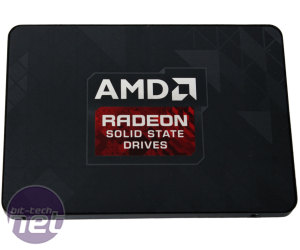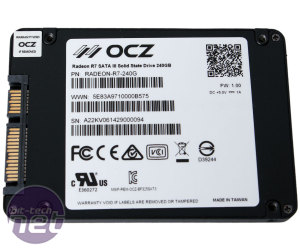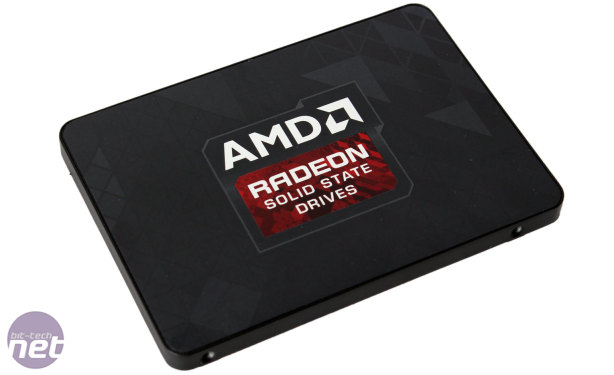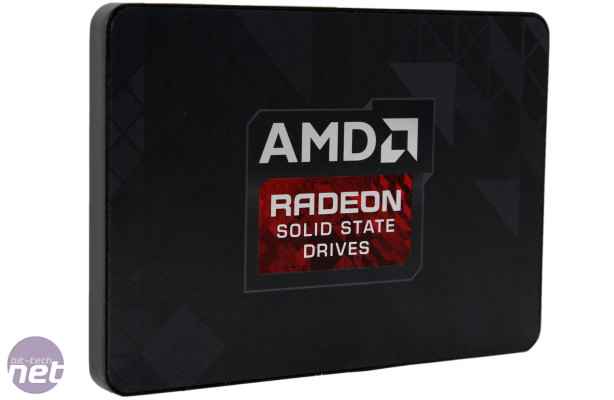AMD Radeon R7 SSD 240GB Review
August 19, 2014 | 08:18
Companies: #amd #ocz #ocz-storage-solutions #toshiba

Performance Analysis
Sequentially, write performance is better than read performance, something we've seen often with the Barefoot 3 controller. Even so, read speeds are competitive in AS SSD at 516MB/sec, but less so in CrystalDiskMark, where we see just 487MB/sec – some way off the quoted 550MB/sec. Writes are very strong though, with the results of 500MB/sec and 522MB/sec and bettered by only a few drives.With random performance, writes again are much stronger than reads. Single queue depth reads have always been a sticking point for this controller – the R7 SSD puts in a better show than the other Barefoot drives, but almost every other SSD is comfortably ahead. Conversely, write performance is excellent, and the R7 SSD trades blows with the Vector 150 at the top of the charts in both test. Random read performance improves at higher queue depths, and again the drive favours AS SSD where it places fourth with 370MB/sec. Meanwhile, the R7 SSD is the best so far in both the 64QD and 32QD random write tests, which is another fantastic result.
Sadly, the mostly strong synthetic performance doesn't translate into great real-world performance, as the R7 SSD is near the bottom of the charts in both PCMark 7 trace-based workloads. It very narrowly manages to beat the Arc 100 (same NAND, slower controller), but loses out in both cases to the Vector 150 (older NAND, same controller), suggesting that the new NAND and/or firmware is partially to blame. The second worst result in the Gaming workload is a particular blow for a Radeon branded drive. This workload is a read heavy trace that simulates loading World of Warcraft. We don't want to generalise too much, but your typical gaming workload does tend to be focussed on reads from storage, as those pretty textures have to come from somewhere, and as mentioned reads aren't as good as writes with the Barefoot 3 controller, which perhaps helps further explain the poor results.
Performance when booting Windows 7 is also fairly average, though the result of 12.21 seconds just about manages to beat the Vector 150.
Performance in our mixed workloads is outstanding, and the R7 SSD places third in all three tests (the fourth one, Web Server, is a read-only test). In each case, it is only ever beaten by more expensive drives, and in the File Server workload it actually manages to beat the Samsung SSD 850 Pro. The Barefoot 3 controller has always been tuned for workloads like this, so it's not surprising to see it do so well. It's definitely good news for gamers who like to record their game footage as they play.
The consistency tests highlight just how similar this drive is to other OCZ offerings, as the curve on the IOPS and response times graph is almost identical to that of the Arc 100. In both cases, the Radeon drive fares a little better because its controller has a higher clock speed, allowing it to process and make available invalid data blocks quicker.
Conclusion
Our estimated price tag of £117 makes the Radeon R7 SSD relatively expensive for a 240GB drive, but even so it's not way off the mark for what it offers. However, as we nearly always say, mainstream users will be best served by the Crucial MX100 or Samsung SSD 840 Evo, both of which are very well priced. But if your workload requires higher performance and endurance, but not quite at the level of truly professional consumer drives like the Samsung SSD 850 Pro, the AMD R7 SSD may be to your satisfaction. It isn't quite as fast, nor is its endurance as high, but it should also be £25-£30 cheaper, and it's no slouch in the speed department either.The gaming-focussed marketing is a bit misleading (as it often is), as it won't make your games run or load faster than the MX100 or SSD 840 Evo (in fact, they might even load a touch slower as the PCMark 7 results suggests). That said, if you're likely to be running the SSD close to full capacity and often like to record footage while playing with services like Raptr or Nvidia's ShadowPlay, then the steady state and mixed workload performance will both be of benefit. The slightly longer warranty and higher endurance compared to entry level drives also can't hurt, but we do feel that for this price users are being left a little short changed with the exclusion of power loss protection and especially hardware level encryption, as these are features found in significantly cheaper drives.
-
Performance46 / 50
-
Features9 / 15
-
Value25 / 35


MSI MPG Velox 100R Chassis Review
October 14 2021 | 15:04












Want to comment? Please log in.